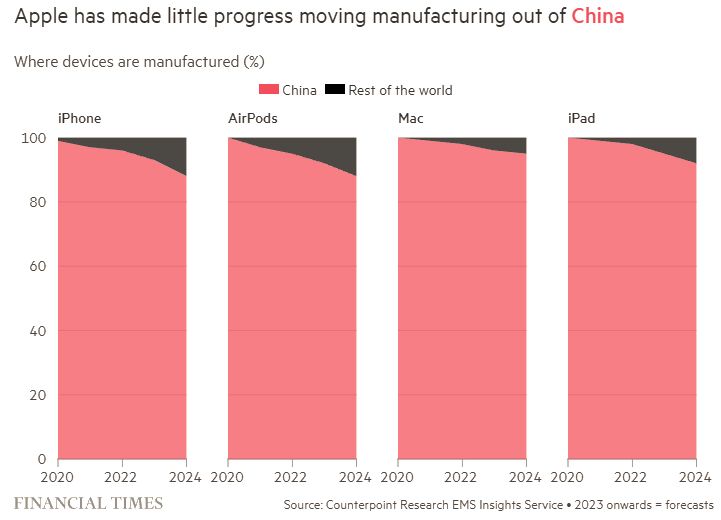The Boomer ascendancy

1—The Boomer ascendancy
At the peak of his fraud, former crypto billionaire Sam Bankman-Fried (SBF) was referred to as a "wunderkind". But at the time of his arrest he was "a grown-ass, 30-year-old man":
"He is twelve years older than many of the men and women we sent to Iraq and Afghanistan. Twelve years older than the adults we encourage to swallow hundreds of thousands of dollars in college debt before even declaring a major."
Katherine Boyle recently argued that the mischaracterisation of SBF is but a symptom of the times:
"The tens of millions of Americans that are, like me, millennials or members of the generation just younger, Gen Z, have been treated as hapless children our entire lives. We have been coded as 'young' in business, in politics, and in culture. All of which is why we shouldn't be surprised that millennials are the most childless and least home-owning generation in modern American history. One can't play house with a spouse or have their own children when they've moved back into mom's, as 17 percent of millennials have.
Aside from the technology sector—which prizes outliers, disagreeableness, creativity and encourages people in their twenties to take on the founder title and to build things that they own—most other sectors of American life are geriatric.
The question is why."
You can read more from Boyle here (~6 minute read), which covers the various theories going around and what the "Boomer ascendancy" and "tri-polar geopolitical order led by septuagenarians and octogenarians" might mean for the future.
2—Wokery vs blokery
Jeremy Clarkson is set to be cancelled by Amazon after penning a rather crude post criticising Harry and Meghan. But is the demise of Clarkson an aberration, or does it signal the demise of the "English male id":
"He is, like it or not, quite a lot of us writ ludicrously, satirically large. Like a 21st-century John Bull: to paraphrase Auden, a self-confident, swaggering bully of meaty neck and clumsy jest. Whatever Clarkson's professional fate, the question of whether our society can tolerate him has implications for the stomach and sensibility of the national character, of which he is a significant avatar and champion. And his rise and fall reads as a history of a changing English firmament, one in which public morality has come to supersede mere entertainment."
That's from Nicholas Harris, who tracked Clarkson's rise in "an England of quick, coarse wit, and quicker, coarser money; of the triumphant red-top, and the unrepentant 'lad'," to his downfall in a world where his "nose and instinct for provocation... [gets him] blown into the no man's land of an interminable culture war".
You can read Harris' full essay here (~6 minute read).
3—Rome wasn't built in a day

4—Japan has changed a lot
If you were asked which East Asian country had the lowest fertility rate, you might be tempted to say Japan. But it actually has the highest rate, above Hong Kong, Macau, Taiwan, China and South Korea. It's just one of the many changes Japan has accomplished over the past couple of decades:
"The city [Tokyo] is actually much more beautifully manicured than when I first saw it two decades ago. Grungy 'shitamachi' areas have been modernized, many dowdy old 'Showa' style apartment buildings have been replaced with modern construction, sculptures and decorations have been added everywhere.
Meanwhile, the glittering signs and soaring towers that we associate with urban Japan have only multiplied. If you're impressed by big buildings, for example, it's impossible to miss the vast, towering structures that the Mori Building Company is putting up all over the city. The biggest one, shown in the photo at the top of this post, is due to open this year. But it's not just big towers getting built. Shopping centres, bars, clubs, and glittering zakkyo buildings (the ones with all the signs) continue to multiply. How could you live in Tokyo for a decade and miss all that?
In fact, Japan's fervour for constant scrap-and-build construction is a major reason why rent there is so affordable, and why local politics haven't halted dense development as they have in the West."
According to Noah Smith, while some Japanese problems have not gone away – such as "corporate ossification, technological slowness, etc" – Japan "has done better in terms of housing policy, construction, landscaping and urbanism than just about any country in the West".
You can read Smith's full post here (~8 minute read).
5—Further reading...
🙅♂️ "North Korean authorities have ordered a five-day lockdown in the capital, Pyongyang, amid an increase in unspecified respiratory illnesses."
🥝 The NYT on Jacinda Ardern: "Mario Cuomo said that we campaign in poetry and govern in prose. Ms. Ardern gave us the poetry, showing that elections can be won with progressive values and a promise to leave no child behind. But you've got to deliver. Rising crime, inflation and stubborn inequality matter more to New Zealand voters than global star power."
🙊 Elon Musk, free speech absolutist: "Twitter and YouTube censored a report critical of Indian Prime Minister Narendra Modi in coordination with the government of India. Officials called for the Big Tech companies to take action against a BBC documentary exploring Modi’s role in a genocidal 2002 massacre in the Indian state of Gujarat."
☢️ "The US Nuclear Regulatory Commission recently announced its approval of the designs for a first-of-its-kind small modular reactor (SMR). This could signal a potential shift in the development and integration of next generation power plants in the US."
🕵️♀️ "Research-integrity sleuths have uncovered hundreds of online advertisements that offer the chance to buy authorship on research papers to be published in reputable journals. Publishers are investigating the claims, and have retracted dozens of articles over suspicions that people have paid to be named as authors, despite not participating in the research."